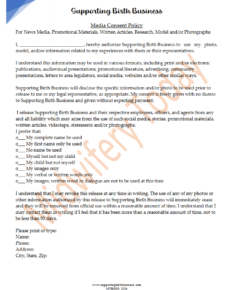
Humor as Natural Medicine
Editor’s note: This article first appeared in Midwifery Today, Issue 87, Autumn 2008.
Join Midwifery Today Online Membership
“A cheerful heart is good medicine, but a downcast spirit dries up the bones.” —Proverbs 17:22
I wish I could think of a punch line for this joke: “A midwife, a doula and an obstetrician walk into a bar…” but, I don’t really need one since I’ve gotten plenty of laughs just with that opening. I’m a big fan of using humor. I find laughter useful in my roles as midwife’s assistant, midwifery student and doula.
Ladies and gentleman, without further ado, I bring you my article on comedy and birth. (Drum roll, please.)

Photo provided by the author
I once attended a lecture by the late Norman Cousins, novelist and professor of medical humanities. He told jokes for two hours and informed the audience that only after the two hours of guffawing and giggling would we be able to remember what he had to teach: that laughter makes people feel good and that if our goal is to help people feel good, we should make our clients laugh.
Research at Loma Linda University by Bark and Tan shows that laughing lowers blood pressure, reduces stress hormones, increases muscle flexion and boosts immune function by raising levels of infection-fighting T-cells, disease-fighting proteins called Gamma-interferon and B-cells, which produce disease-destroying antibodies. Laughter also triggers the release of endorphins—the body’s natural painkillers—and produces a general sense of well-being.
At the 2008 Midwifery Today conference in Philadelphia I informally surveyed presenters and attendees for either their favorite joke to tell at a birth or the funniest thing that ever happened at a birth. Ina May Gaskin said she likes poop jokes and Gail Hart likes singing camp songs. Robbie Davis-Floyd told about a friend acting as a doula who became so entranced with the laboring mom that she forgot to breathe and fainted on top of the gal she was there to help. Robbie also told us to look in the index of William’s Obstetrics, Volume 16, under “chauvinism, male.” It will direct you to pages 1–1001.
I collected a whole slew of stories from participants that begin with “Did you hear the one about the doula/midwife who…” and “Did you hear about the placenta that…”
Ina May recommends the following humor assessment story. “Did you ever notice that you can have a stomach pain and then fart, and you feel better? Imagine if people went to the emergency room to fart?”
A midwife I know tells the following joke with similar intention. Holding her index and pointer fingers up on one hand she asks “Why can’t you use these two fingers to masturbate?”
“Um, I dunno,” comes the answer.
“Because they’re mine!”
This type of humor helps diagnose connection and comfort with the bottom of the body. Slapstick isn’t often called for, but don’t rule it out. A laboring woman looked at me with fearful pleading eyes as she reached her 12th hour of labor and asked, “What do women do to get through this?”
With a straight face, I replied, “The girls in France do the hula-hula dance,” as I swung my hips. That helped inspire her to laugh and move.
Being from New York, I like self-deprecating humor in the style of Woody Allen and Joan Rivers. I find that playing up my own insecurities helps level the playing field from my perceived expert status. I stay rooted in a firm belief that no matter what I know, I hardly know anything at all. In this way, I affirm that the unknowns of birth and life itself are every woman’s dilemma, and like the bumbling fools in classic comedy, with innocence and good intentions the best we can do is learn as we stumble along in our misadventures.
I’ve found using humor at birth to be safe and effective. A good giggle can change the energy for the better and bring perspective to a situation that is getting stale. A couple’s tolerance for and enjoyment of different types of humor should be assessed prenatally. Inside jokes can help people feel seen and heard. I look for opportunities to develop this connection during prenatal contact. Inside jokes often take the form of teasing and exaggerating issues. This type of humor isn’t without risk, so careful assessment and accurate dosing must be considered.
Once when a mother who was having a VBAC was lamenting that her uterus was the world’s most ineffective, I launched into a spontaneous bit about calling the people at the Guinness Book of World Records so she could take her rightful place in history. Both she and her husband cracked up, and I went on a little longer wondering what time it was in London and whether they had a category for the uterus, fretting about there not being enough time to get verification, etc. Four hours later she gave birth vaginally to a 9 lb baby.
A safer way to use exaggeration is to depersonalize it with a story. Midwife Martha Roth told me this joke: A man is out on his back porch all night wringing his hands, pacing and chewing his fingernails while his wife is in labor upstairs. Finally, near morning the midwife comes out and congratulates him on the birth of a daughter. The man exclaims “Oh, thank goodness it’s a girl so she won’t ever have to go through what I just went through!” This joke is remarkably effective at re-routing energy that is being siphoned off by a husband who is unable to fully grasp that the birth is not about him.
Warnings and contraindications: In many cultures and communities sexual and bawdy jokes are inappropriate and should not be used. I often have the opportunity to work with a religiously orthodox community and while I bring lightheartedness to my contact with the families there, I leave the jokes out.
I never attempt teasing if I don’t have a genuine sense of love and respect for the woman. If I feel any sense of annoyance with her or if I feel that she has a fragile ego or an uptight sense of dignity (not surprisingly, traits I find very annoying), I won’t attempt to tease. I’ve found that if a woman feels respected and understood, teasing helps her know that I “get her.” Additionally, I wouldn’t be self-deprecating if I didn’t feel that I was being respected.
If you think humor might be the right medicine then I advise you to include the following in your birth bag. They’re light-weight and almost never reach an expiration date.
- Puns
- Inside jokes
- One-liners
- Funny stories
- Self-deprecating humor
- Teasing/exaggerated mocking
- Making fun of body parts
- Poop jokes





















